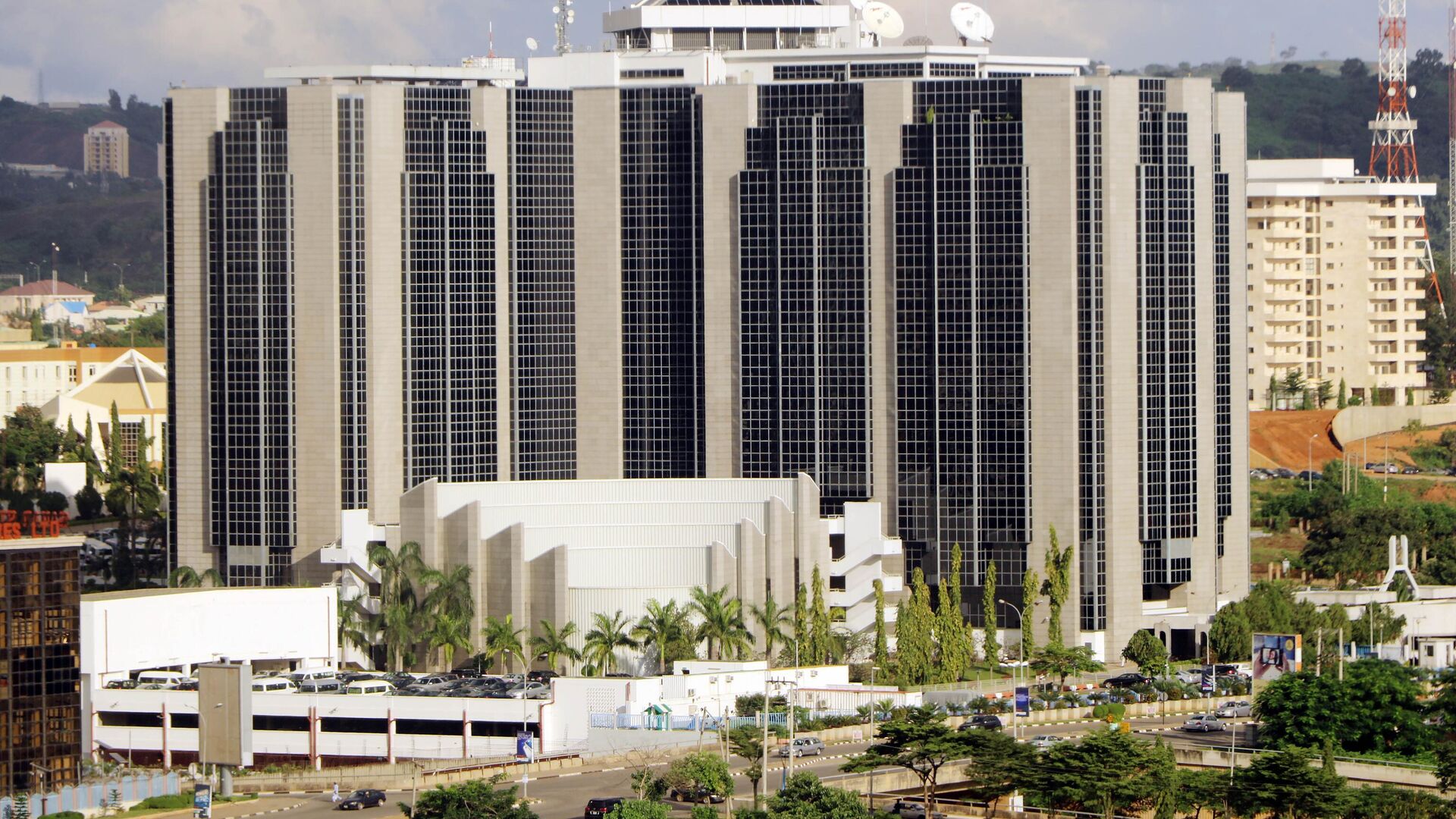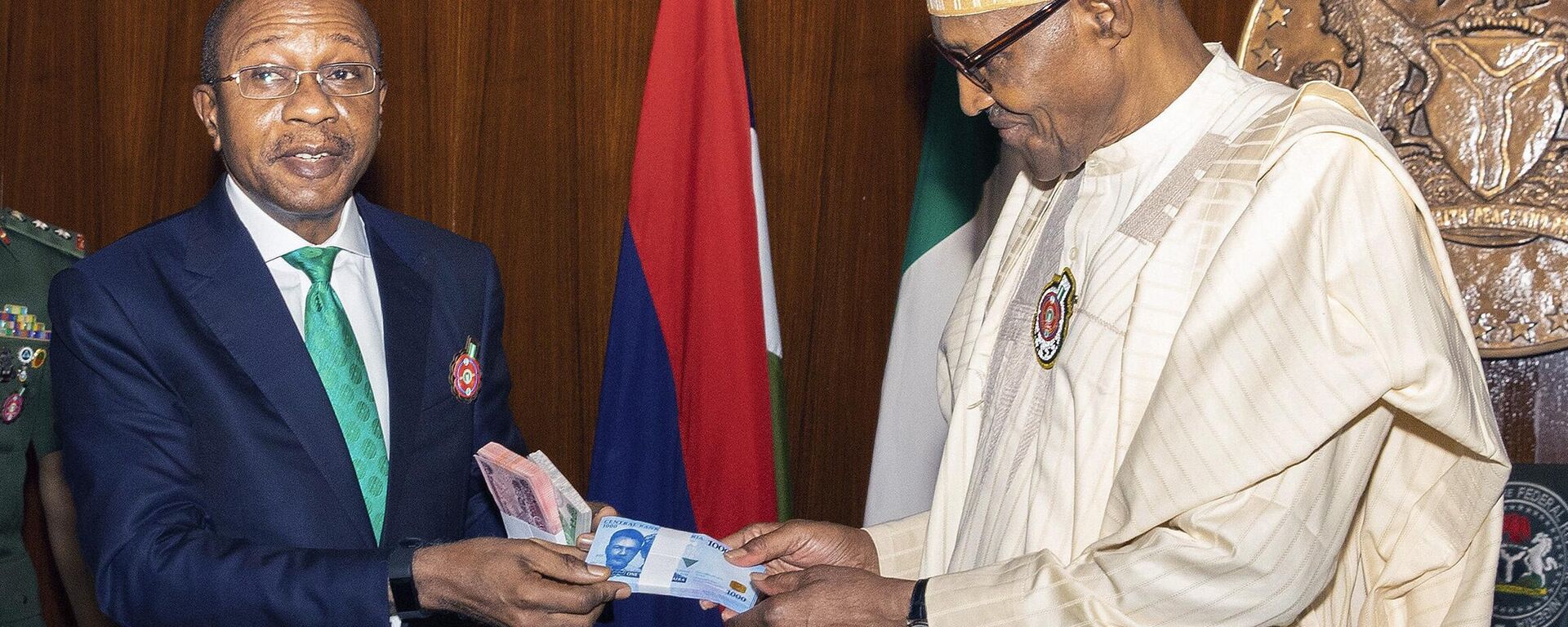https://en.sputniknews.africa/20230616/nigeria-allows-markets-to-determine-exchange-rate-to-stabilize-economy-1059959448.html
Nigeria Allows Markets to Determine Exchange Rate to Stabilize Economy
Nigeria Allows Markets to Determine Exchange Rate to Stabilize Economy
Sputnik Africa
For years, Nigeria has had several naira (local currency) exchange rates. The official rate was determined by the central bank, whereas a much higher... 16.06.2023, Sputnik Africa
2023-06-16T14:39+0200
2023-06-16T14:39+0200
2023-08-03T10:44+0200
sub-saharan africa
nigeria
west africa
central bank
bola tinubu
currency
trade
economy
https://cdn1.img.sputniknews.africa/img/07e7/06/10/1059960480_0:160:3072:1888_1920x0_80_0_0_0d184c91c586561498a29b14233bc6eb.jpg
The Central Bank of Nigeria has announced that it is allowing market forces to set the exchange rate, a move that experts say is designed to stabilize the local currency.Abandoning the multiple exchange rate regime would reportedly boost the money supply and help stabilize an economy plagued by inflation and unemployment.The expert added that this policy sparked a trade that exploited the price difference between the two markets "at the expense of legitimate economic activities".Those held hostage by the system were foreign investors forced to sell foreign currencies to the central bank of Nigeria at the official exchange rate with no access to foreign money amid the acute shortage of dollars in the country.The pledge to stabilize the naira was included by the newly elected Bola Tinubu in his election manifesto: Renewed Hope 2023; Action Plan for a Better Nigeria.Tinubu, who came to power late last month after tight February presidential elections, ousted Godwin Emefiele, head of the central bank, who was slammed for introducing new money bills that led to a critical shortage of cash to pay for daily necessities.Emefiele was also criticized for the demonetization policy launched just before the Nigerian presidential elections.
https://en.sputniknews.africa/20230610/nigerian-president-tinubu-suspends-central-bank-governor-amid-investigation-1059830191.html
nigeria
west africa
Sputnik Africa
feedback@sputniknews.com
+74956456601
MIA „Rossiya Segodnya“
2023
Maxim Grishenkin
https://cdn1.img.sputniknews.africa/img/07e7/0a/17/1063018107_0:0:1104:1103_100x100_80_0_0_03090c85a11f5d2e8a19cf1d989443c9.jpg
Maxim Grishenkin
https://cdn1.img.sputniknews.africa/img/07e7/0a/17/1063018107_0:0:1104:1103_100x100_80_0_0_03090c85a11f5d2e8a19cf1d989443c9.jpg
News
en_EN
Sputnik Africa
feedback@sputniknews.com
+74956456601
MIA „Rossiya Segodnya“
Sputnik Africa
feedback@sputniknews.com
+74956456601
MIA „Rossiya Segodnya“
Maxim Grishenkin
https://cdn1.img.sputniknews.africa/img/07e7/0a/17/1063018107_0:0:1104:1103_100x100_80_0_0_03090c85a11f5d2e8a19cf1d989443c9.jpg
nigeria, west africa, central bank, bola tinubu, currency, trade, economy
nigeria, west africa, central bank, bola tinubu, currency, trade, economy
Nigeria Allows Markets to Determine Exchange Rate to Stabilize Economy
14:39 16.06.2023 (Updated: 10:44 03.08.2023) For years, Nigeria has had several naira (local currency) exchange rates. The official rate was determined by the central bank, whereas a much higher unofficial rate dictated the price of imported goods, such as wheat, which are valued in dollars.
The Central Bank of Nigeria has announced that it is allowing market forces to set the exchange rate, a move that experts say is designed to stabilize the local currency.
Abandoning the multiple exchange rate regime would reportedly boost the money supply and help stabilize an economy plagued by inflation and unemployment.
"The multiple exchange rate regime was a major distortion to the workings of the market, such that there was no level playing field for many actors," Taiwo Oyedele, Fiscal Policy Partner and Africa Tax Leader at financial services firm PwC, told media.
The expert added that this policy
sparked a trade that exploited the price difference between the two markets "at the expense of legitimate economic activities".
Those held hostage by the system were foreign investors forced to sell foreign currencies to the central bank of Nigeria at the official exchange rate with no access to foreign money amid the acute shortage of dollars in the country.
"This is the major reason foreign portfolio investments and foreign direct investments have literally dried up over the past couple of years," Oyedele said. "Tackling this critical issue will unlock investments which will lead to growth, employment generation and revenue for the government to provide social needs."
The pledge to stabilize the naira was included by the newly elected Bola Tinubu in his election manifesto: Renewed Hope 2023; Action Plan for a Better Nigeria.
Tinubu, who
came to power late last month after tight February presidential elections, ousted Godwin Emefiele, head of the central bank, who was slammed for introducing new money bills that led to a critical shortage of cash to pay for daily necessities.
Emefiele was also criticized for the demonetization policy launched just before the Nigerian presidential elections.



